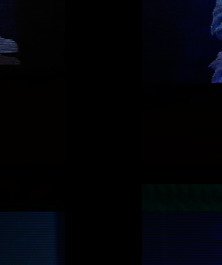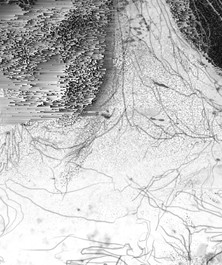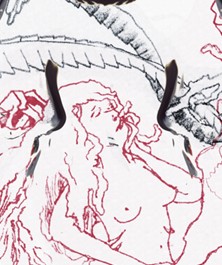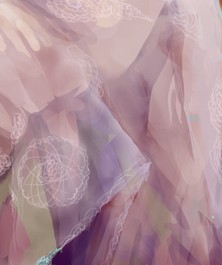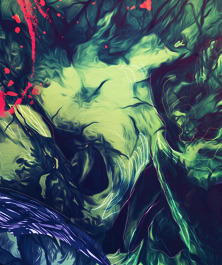Artist Interviews
- XXXI Gabriel Simonds
- XXX Vigan Tafili
- XXIX Parker Gibson
- XXVIII Courtney Wooster
- XXVII Brandon Spahn
- XXVI ricardo juarez
- XXV Daniel Kong
- XXIV Willis Kingery
Spotlight
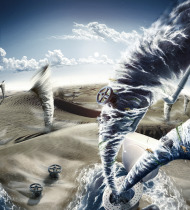 So clean
by Matteo Della Chiesa
View image
So clean
by Matteo Della Chiesa
View image Support Evoke
The Interview

Ted Yavuzkurt:
{1} Who is Daniel Kong? Let us in a bit to who you are, what makes you tick, and how art is a part of your life.
Daniel Kong:
There's not much to say, really. I'm an academics focused guy who happens to have art and not much else as an interest. By art I don't just mean visual art, but also film (I would consider myself something of a connoisseur, but I'm sure others would call me a hipster), music ( 90's East coast hip-hop, and, uh, Leonard Cohen), literature (feel free to call bullshit on this though), and anything else. Besides that I'm mainly focused on my studies; I'm majoring in mathematics and economics, and minoring in computer science.
Ted Yavuzkurt:
{2} That's quite an academic program for someone as artistically gifted as you!
Being an all around appreciator of the arts, do you play any instruments or dabble in any other mediums (i.e. photography), or is digital visual art your sole focus?
Daniel Kong:
Dabble would indeed be the right word there. I play a little bit of guitar and had several years of classical training in violin as a kid. As for photography, I would lucky to find the menu to adjust the zoom.
Digital arts isn't the only way I draw, though; I probably do more traditional art than digital art, and maintain a few sketchbooks. I also do oil painting but I'm not very proud of my skills there.
Ted Yavuzkurt:
{3} Well, it's obvious what makes you different from your average 'hipster.' You can back up your interest with actual talent that doesn't consist of going to a starbucks and opening a copy of photoshop on your macbook while you sip your iced chai.
Such talent takes time to develop. And so I'm sure everyone would like to know how long you've been interested in/creating art? What piqued your interest initially and what has kept you going since?
Daniel Kong:
Full disclosure, I'm typing on a Macbook right now.
Maybe when I was four or five, I realized I had a knack for drawing. My parents were encouraging and signed me up for classes, so I developed good drawing skills at a pretty young age.
I doodled a ton during school, which was good practice, and I vividly remember my fourth grade teacher being upset that my homework assignments had doodles all over them. She contemptuously told me to have some pride in my work. Ironically, I think that's what pushed me towards improving artistically: having pride in my work.
I hit a brick wall when I was trying to learn how to paint a few years later, and as a result stopped drawing for a couple years, but digital art pushed me back into it with more determination than before.
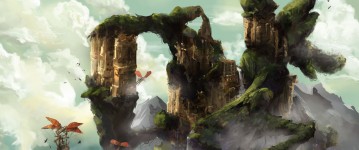
Ted Yavuzkurt:
{4} I know that in the music industry right now, especially when it comes to DJing, you see a lot of people who are very angry when they discover DJs who only learned their craft via digital techniques and who cannot throw together a mix without the aid of a computer. The rationale for this is that mastering analog, low-tech methods improves ones ability to appreciate music. I see a lot of similar parallels in the world of art. Many 'artists' now learn solely by sitting down with Photoshop and screwing around until something cool comes out; certainly there many who have gotten far starting in this manner.
So coming from your background learning traditional techniques first, what do you think the role of computers and technology are when it comes to art? Can you get the same feel for art 'digitally' as you can hands on?
Do you think that having that firm traditional foundation before exploring the digital frontier helped your artistic development in the long run? i.e. do you think you could be where you are today having learned everything with digital tools?
Daniel Kong:
I'm a huge proponent of advancing technology. Technical skill and dexterity are a huge part of what we consider classical arts. But they are not the art itself. Imagine a mechanism that could read minds, and render into reality the creative thoughts of an artist. That would be art in its purest form.
Computers, Photoshop, and mixing programs help move us toward this form of pure art, such that the only variable in art is creativity. Does this devalue the artist? Probably, but art itself would advance. I'm sure others would argue that technical skill and dexterity are just as big a part of art as creativity, but I'm in the other, lonelier school.
Physical drawing is a whole lot easier to learn than digital art in its current form. I always encourage people to pick up a pencil before buying a tablet. Same with painting - though my patience for waiting for paint to dry is as thin as the layer of paint my frugality allows. I wouldn't have any objections for beginning to learn on a digital medium once the technology is there though.
to pick up a pencil before
buying a tablet.
Ted Yavuzkurt:
{5} So you're arguing that creativity is something innate to the artist. If a system were created that could render thoughts as imagery then the variable of technical skill would completely leave the picture. Thus we'd instantly see who was actually an artist and who was merely following photoshop tutorials.
But I've seen cases where an artist improves simultaneously in technique and creativity. The very ideas an artist tries to convey become more complex over time, suggesting that creativity can be learned and cultured. Therefore cutting corners technically means cutting corners creatively. Many 'purely digital' artists (and musicians) end up cutting corners, becoming only great imitators. Developing creativity and 'having something to say' is certainly the hardest part of being an artist.
Then again, maybe I'm wrong. Do you think creativity can be learned or developed? How do you personally come up with ideas? Are there factors in your lifestyle and environment that foster creativity?
Daniel Kong:
I don't think that technique improvement causes creativity improvement, but rather they are both a function of age and experience. Indeed, often creativity is confused with experience. I believe creativity, like intelligence, has a degree of innateness, where there is a range, and the environment determines where they fall in this range. I'm probably just regurgitating some basic psychology theories, but that seems about right.
I take a lot of inspiration from the art I consume, and remodel it in my own way, but it's probably not my biggest influence. People tend to only see art when it's framed, but life offers so much beautiful stimuli that inspiration can be taken from absolutely anywhere. My most complete ideas tend to compile and form when I'm between the moments of sleep and wake.
I tend to be the most ambitious then, and I suspect it's not because of increased creativity, but lack of inhibition. I can form complete pictures in my head because nothing is telling me that it is a bad idea. Imagine the thoughts I will have on my deathbed! To this end, I think what artists need isn't more inspiration, but less apprehension.
taken from absolutely
anywhere
Ted Yavuzkurt:
{6} That's certainly a very Zen way of looking at the creative process; I'm sure many aspiring artists can benefit from your wisdom.
In any case, to avoid boring everyone to death with pure philosophy, let's get down to brass tacks. I take it, given your intense academic program, that you do not plan on using your art as a career path. Will you be a pure, die-hard hobbyist (for lack of a better word) till the end?
Daniel Kong:
Haha, wisdom? You give me too much credit. If I'm lucky, I hope to become a professional artist after I retire from whatever the hell I end up doing, but if not, then yeah, it will always be only a hobby to me.
Ted Yavuzkurt:
{7} What year are you in college?
Daniel Kong:
Just started my sophomore year, but I may end up graduating early, so it could even be considered my junior year. And no, I'm in no way ready to face the real world.
Ted Yavuzkurt:
{8} Haha, I don't think anyone is ever ready to face 'the real world' - but that's a discussion for another time.
What I find admirable here is that you've seen a passion through from early childhood to college without letting up. Most of the problems we've experienced here at Evoke were because people grew up, realized they had to get "real" jobs, and stopped putting in as much time and effort. This is everywhere these days. Our society seems founded on the idea that cash is king and realism is everything. Hobbies like art are prioritized last.
So what's your secret? How much time do you actually spend on art on average (and has this time decreased since you were in High School)? How do you fit in making art? How do you keep your enthusiasm and interest up when there's so much else to be done?
Daniel Kong:
It's not like art is a chore to me; it's fun and relaxing. Sometimes I'll paint until the early hours; just throw-away doodles and photo studies, because it is a hobby, and nothing more. I don't get stressed about it, and I think I've increased the amount of time I spend painting since high school because my hobbies from high school have faded.
During June, I tried a "draw something everyday" challenged, and that was hell. I can see how some people can get burnt out on art when it becomes compulsory. I don't think school work has ever prevented me from doing extracurriculars, but maybe it's because I don't dread school work like many people do.
I chose my majors because they interest me, as does art. They naturally balance themselves as they vie for my attention.
burnt out on art when
it's compulsory
Ted Yavuzkurt:
{9} So basically, everyone needs to chill out. I can dig it.
What's your usual process when creating a piece? Do you make sketches first? Do you think for a while beforehand about concept or just start drawing? Do you usually finish things (at least almost) in one go or do you take lots of breaks and keep adjusting till something is complete?
Daniel Kong:
It definitely varies. My methods and motivation are capricious, and I prefer it that way. Some regularities do emerge though. It usually starts out with a fraction of a concept, which will barely be detectable in the end product. Then I lay out the composition in a thumbnail sketch, as well has doodle some interesting elements that I will consider adding. From then on out it depends on the piece. Sometimes I will start with line art and other times I take a large brush and blot down colors. I usually do most of the work in one sitting, though.
Ted Yavuzkurt:
{10} Pick your favorite work you've submitted to Evoke in your time here and walk us through your process creating it.
(note: pictured below)
Daniel Kong:
My favorite is 'That Delicate Madness,' which was quite experimental for me stylistically. The basic technique of making the piece is using the lasso to create a shape, and painting in the shape with strong colors and varied brush opacity. Some of my earlier pieces were vectors with a somewhat similar style, and my experience with vector illustrations inspired me to develop this technique.
In much the same way, I draw outlines rather than the actual shape. I found that this new method gave me more freedom to do experiment because of the nature of raster versus vector. Thematically, the piece evolved from my fascination of vegetation, which can at the same time seem abstract and concrete.
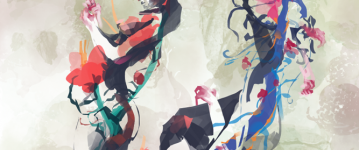
Ted Yavuzkurt:
{11} It's certainly an interesting piece. At first glance one thinks you painted the whole thing but a closer examination reveals that is not the case.
What are your favorite tools of the trade? If you were trapped on a desert island (assuming you had power) what could you not do without hardware and software wise?
Daniel Kong:
Photoshop is my weapon of choice, though I also use Illustrator and various specialty painting programs as needed. If I was on a desert island though, I might just prefer to stick it out and use traditional media to pass the time. Nothing seems more intoxicating than standing on the beach all day and painting the waves.
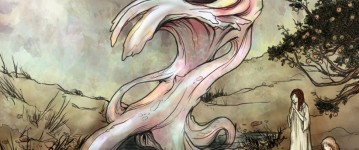
Ted Yavuzkurt:
{12} What is your opinion of online art collectives? Are they a good place for artists to congregate and share tricks and techniques or just cesspools of recycled ideas?
Daniel Kong:
They are a great place for artists to collaborate and bounce ideas back and forth, as well as make connections. The critique and encouragement definitely helps to push one's art to the next level. I can understand it not being for everyone, but I think it's a great opportunity for artists to convene and share their creative insight.
improving yourself,
people will notice
Ted Yavuzkurt:
{13} What advice would you give to the newer artists out there?
Daniel Kong:
Focus on improving your skills before marketing yourself. I notice that many digital artists seem to prioritize publicity, and will fervently use social networking, emails to magazines, and whatever other methods they can to put themselves out there. They ignore the fundamental aspect of being an artist to the point where it's almost shameful. Now, my livelihood is not based on art, so maybe I don't understand the necessity of it all, but then again maybe I have a clearer perspective on it. If you focus on improving yourself, people will take notice, and it will become easier to market yourself respectably.
Ted Yavuzkurt:
{14} That's certainly one of the pitfalls of cutting corners like I mentioned earlier. You just hit the nail on the head.
Anyway, I'm sure you've gotta go work on some of that math, computer science, and economics you've got going on so I'm going to hit you with Dalla's famous top 10 list to wrap this up. What advice would you give to the newer artists out there?
Daniel Kong:
1. Favorite Food?
Eggplant Parmesan
2. Do you think you're sexy?
Are you hitting on me?
3. Pepsi or Coke?
Coke has the better logo
4. What's your favorite gaming console?
PC, because I can not game on it
5. Favorite band or musical artist?
Leonard Cohen
6. Blonde or Brunette?
Brunette, blondes never seem to match my shoes
7. If you could live anywhere in the world, where would it be?
Underwater. How cool would it be to be able to breathe underwater?
8. Favorite Sport?
American football
9. Mac or PC?
Mac
10. What is your current homepage?
Google
Ted Yavuzkurt:
{15} Any last words?
Daniel Kong:
I'm going to sleep well tonight.

